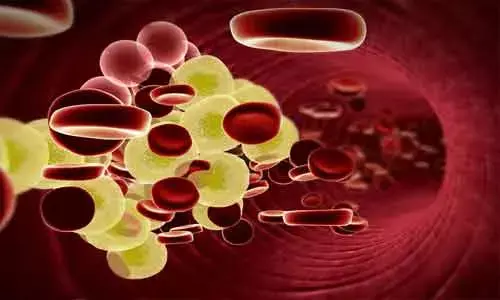- Home
- Medical news & Guidelines
- Anesthesiology
- Cardiology and CTVS
- Critical Care
- Dentistry
- Dermatology
- Diabetes and Endocrinology
- ENT
- Gastroenterology
- Medicine
- Nephrology
- Neurology
- Obstretics-Gynaecology
- Oncology
- Ophthalmology
- Orthopaedics
- Pediatrics-Neonatology
- Psychiatry
- Pulmonology
- Radiology
- Surgery
- Urology
- Laboratory Medicine
- Diet
- Nursing
- Paramedical
- Physiotherapy
- Health news
- Fact Check
- Bone Health Fact Check
- Brain Health Fact Check
- Cancer Related Fact Check
- Child Care Fact Check
- Dental and oral health fact check
- Diabetes and metabolic health fact check
- Diet and Nutrition Fact Check
- Eye and ENT Care Fact Check
- Fitness fact check
- Gut health fact check
- Heart health fact check
- Kidney health fact check
- Medical education fact check
- Men's health fact check
- Respiratory fact check
- Skin and hair care fact check
- Vaccine and Immunization fact check
- Women's health fact check
- AYUSH
- State News
- Andaman and Nicobar Islands
- Andhra Pradesh
- Arunachal Pradesh
- Assam
- Bihar
- Chandigarh
- Chattisgarh
- Dadra and Nagar Haveli
- Daman and Diu
- Delhi
- Goa
- Gujarat
- Haryana
- Himachal Pradesh
- Jammu & Kashmir
- Jharkhand
- Karnataka
- Kerala
- Ladakh
- Lakshadweep
- Madhya Pradesh
- Maharashtra
- Manipur
- Meghalaya
- Mizoram
- Nagaland
- Odisha
- Puducherry
- Punjab
- Rajasthan
- Sikkim
- Tamil Nadu
- Telangana
- Tripura
- Uttar Pradesh
- Uttrakhand
- West Bengal
- Medical Education
- Industry
Paradox: High HDL-C levels tied to higher mortality risk in CAD patients, JAMA Study

USA: Using data from two prospective cohort studies, in the U.K. and U.S., the researchers in a recent study revealed that both very low and very high HDL levels are associated with an increased risk of mortality. The study appears in the Journal of the American Medical Association - Cardiology.
The researchers state, "very high HDL-C levels are paradoxically associated with higher mortality risk in patients with coronary artery disease (CAD). This association was not dependent on the common polymorphisms associated with high HDL-C levels."
Previous studies have shown an inverse relationship between higher high-density lipoprotein cholesterol (HDL-C) levels and cardiovascular risk. However, recent data on the general population have shown an increased risk of adverse outcomes at very high concentrations of HDL-C. To verify the same, Chang Liu, Emory University School of Medicine, Atlanta, Georgia, and colleagues aimed to examine the association between very high HDL-C levels (>80 mg/dL) and mortality in CAD patients. They also investigated the association of known HDL-C genotypes with high HDL-C level outcomes.
For this purpose, the researchers conducted a prospective, multicenter, cohort study from 2006 to present in the UK and from 2003 to present in Atlanta, Georgia. They recruited patients with CAD from the UK Biobank (UKB) and the Emory Cardiovascular Biobank (EmCAB), respectively. Patients without confirmed CAD were not included. Data analyses were conducted from May 10, 2020, to April 28, 2021.
All-cause death was the primary outcome. The secondary outcome was cardiovascular death. The study included a total of 14 478 participants (mean age, 62.1 years; 11 034 men [76.2%]) from the UKB and 5467 participants (mean age, 63.8 years; 3632 men [66.4%]) from the EmCAB.
Based on the study, the researchers reported the following:
- Over a median follow-up of 8.9 years in the UKB and 6.7 years in the EmCAB, a U-shaped association with outcomes was observed with higher risk in those with both low and very high HDL-C levels compared with those with midrange values.
- Very high HDL-C levels (>80 mg/dL) were associated with an increased risk of all-cause death (hazard ratio [HR], 1.96) and cardiovascular death (HR, 1.71) compared with those with HDL-C levels in the range of 40 to 60 mg/dL in the UKB after adjustment for confounding factors.
- These results were replicated in the EmCAB.
- These associations persisted after adjustment for the HDL-C genetic risk score within the UKB.
- Sensitivity analyses demonstrated that the risk of all-cause mortality in the very high HDL-C group was higher among men than women in the UKB (HR, 2.63 vs HR, 1.39).
The researchers conclude, "results of this cohort study indicate that very high HDL-C levels are paradoxically associated with higher mortality risk in CAD patients. This association was independent of the common polymorphisms associated with high HDL-C levels."
Reference:
Liu C, Dhindsa D, Almuwaqqat Z, et al. Association Between High-Density Lipoprotein Cholesterol Levels and Adverse Cardiovascular Outcomes in High-risk Populations. JAMA Cardiol. Published online May 18, 2022. doi:10.1001/jamacardio.2022.0912
Dr Kamal Kant Kohli-MBBS, DTCD- a chest specialist with more than 30 years of practice and a flair for writing clinical articles, Dr Kamal Kant Kohli joined Medical Dialogues as a Chief Editor of Medical News. Besides writing articles, as an editor, he proofreads and verifies all the medical content published on Medical Dialogues including those coming from journals, studies,medical conferences,guidelines etc. Email: drkohli@medicaldialogues.in. Contact no. 011-43720751


